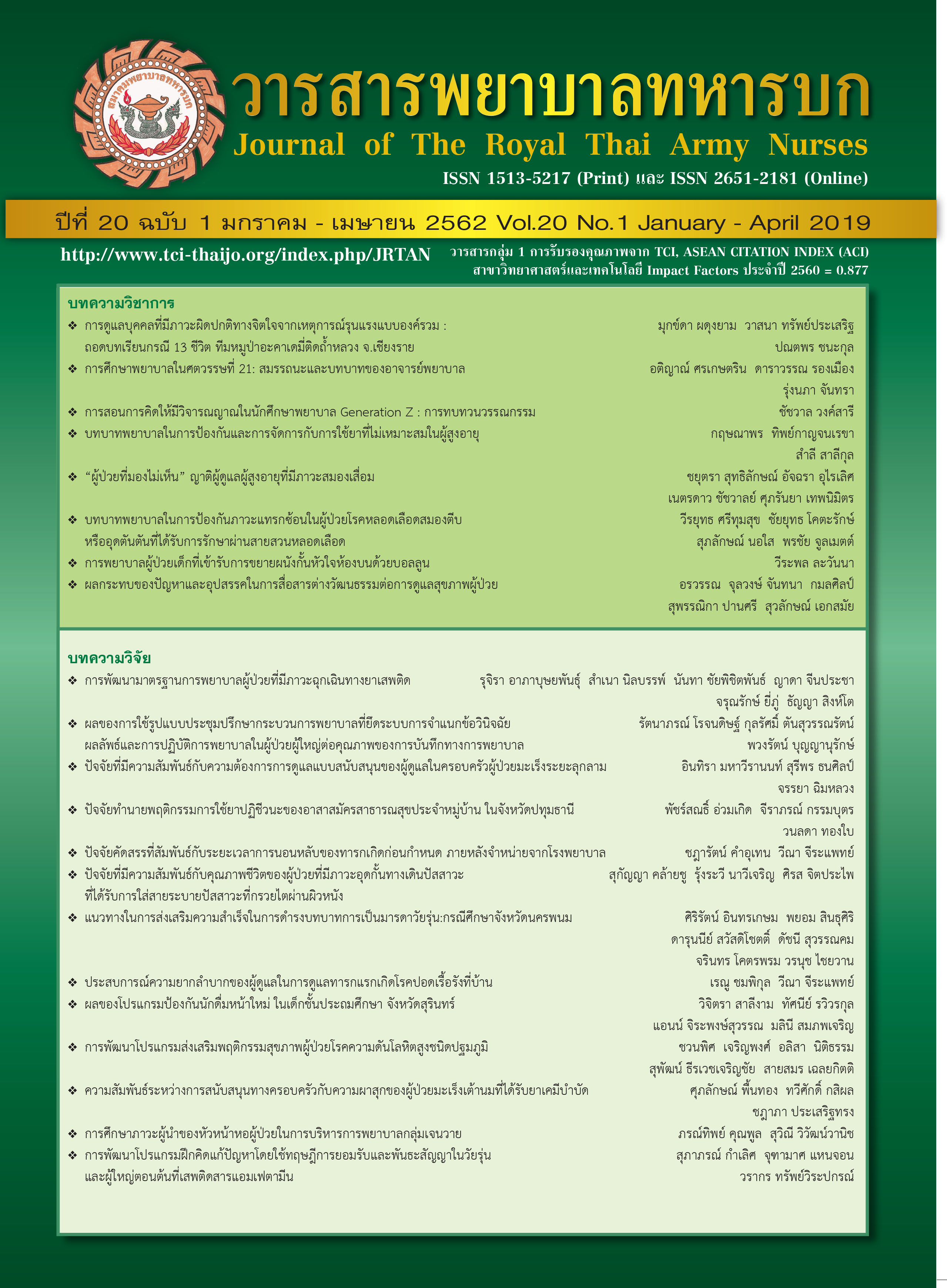Selected Factors Related to Sleep Duration in Preterm Infant after Discharge from Hospital
Keywords:
Preterm infant, Sleep duration, Relational FactorsAbstract
The research was to examine the sleep duration of preterm infants after discharge and the relationship between the intrinsic factors (sex, gestational age and type of milk) and the extrinsic factors (maternal stress, mother-neonate relationship, family income and mothers’ education level). Subjects consisted of 130 pairs of mothers and their preterm infants with gestational ages of 28 to 35 weeks and first time admitted to the hospital. They were selected by using multistage random sampling. Research instruments included questionnaires of mothers’ and preterm neonates’ personal factors, sleep log form, maternal stress questionnaire, mother-neonate relationship questionnaire. Data ware analyzed by Pearson’s product moment correlation coefficient and Chi-square test. Research findings were as follows: The sleep duration of preterm infant was inadequate f significantly correlation with the sleep duration of preterm infant (χ2 = 15.405, 12.438 and 15.123, p <.01, respectively), gestational age and mother-neonate relationship were significantly positive correlation with the sleep duration of preterm infant (r = .491 and .265 , p< .01 respectively) and maternal stress was significantly negative with the sleep duration of preterm infants (r = -.364, p<.01) Research results suggest knowledge for nursing practice in premature infant discharge preparation for the mother. Nurses can promote preterm infants adequate sleep duration after discharge home by promoting mother-neonate relationship and preparing mother for managing stress especially for lactation performance.
Downloads
References
Centers for Disease Control and Prevention. National vital statistic reports. 2016 Dec 3.[Epub ahead of print]
Kolatat T. Integration of maternal and child health systems. Bangkok: Amarin Printing & Publishing Public Company Limited; 2008. (in Thai)
Teerarungsikul N. Nursing care for preterm infants. Bangkok; 2002. (in Thai)
VandenBerg KA. State systems development in high-risk newborns in the neonatal intensive care unit: identification and management of sleep, alertness, and crying. The Journal of perinatal & neonatal nursing. 2007 Apr 1; 21(2):130-9.
Mindell JA, Lee C. Sleep, mood, and development in infants. Infant behavior and development. 2015; 41: 102-7.
Blackburn,S.T. Maternal Fetal & Neonatal physiology A Clinical Perspective. Saunders ELSEVIER. America; 2007.
Holditch-Davis D, Blackburn ST, VandenBerg K. Newborn and infant neurobehavioral development. Comprehensive neonatal nursing: A physiologic perspective. 2003;3: 236-84.
Schwichtenberg AJ, Poehlmann J. A transactional model of sleep–wake regulation in infants born preterm or low birthweight. Journal of pediatric psychology. 2008 Dec 19;34(8): 837-49.
Fallon, J. Growing Up in Ireland: Factors Impacting Sleep Patterns of Preterm Infants. Virginia Commonwealth University; 2015.
Thorndike RM. Correlational procedures for research. Wiley; 1978.
Kaikul S, Chaimongko N, Paktoop M. Relationship between Parental stress, and parent-child relationship. Journal of Nursing Care. Boromarajonani, Chonburi. 2009; 22(2). (in Thai)
Foreman, S. W., Thomas, K. A., & Blackburn, S. T. Individual and gender differences matter in preterm infant state development. Journal of Obstetric, Gynecologic, & Neonatal Nursing. 2008; 37(6): 657-65.
Thomas, K.A.Differential Effects of Breastand Formula-Feeding on Preterm Infants’ Sleep-Wake Patterns. Journal of Obstetric, Gynecologic, & Neonatal Nursing. 2000; 29(2): 145-52.
Wongphinit U, Sinsuksai N, Yusamran C. Personal Factors, Social Support and Effect Sucking at Discharge in Predicting, Exclusive Breastfeeding at one Month Among First-Time Mothers. Journal of Royal Thai Army Nurse. 2016; 17(1): 88-95. (in Thai)
Nevarez MD, Rifas-Shiman SL, Kleinman KP, Gillman MW, Taveras EM. Associations of early life risk factors with infant sleep duration. Academic pediatrics. 2010 May 1;10(3):187-93.
Prasopkittikun T, Tilokskulchai F, Vipuro N. Relationship between Selected Factors and Parenting Stress in Mothers. Journal of Nursing Science 2010; 28(1): 19-27. (in Thai)
McNamara, P., Belsky, J., & Fearon, P. Infant sleep disorders and attachment: Sleep problems in infants with insecure-resistant versus insecure-avoidant attachments to mother. Sleep and Hypnosis. 2003; 5: 17-26.
Schwichtenberg AJ, Anders TF, Vollbrecht M, Poehlmann J. Daytime sleep and parenting interactions in infants born preterm. Journal of developmental and behavioral pediatrics: JDBP. 2011 Jan;32(1):8.
Downloads
Published
How to Cite
Issue
Section
License
บทความหรือข้อคิดเห็นใดใดที่ปรากฏในวารสารพยาบาลทหารบกเป็นวรรณกรรมของผู้เขียน ซึ่งบรรณาธิการหรือสมาคมพยาบาลทหารบก ไม่จำเป็นต้องเห็นด้วย
บทความที่ได้รับการตีพิมพ์เป็นลิขสิทธิ์ของวารสารพยาบาลทหารบก
The ideas and opinions expressed in the Journal of The Royal Thai Army Nurses are those of the authors and not necessarily those
of the editor or Royal Thai Army Nurses Association.






